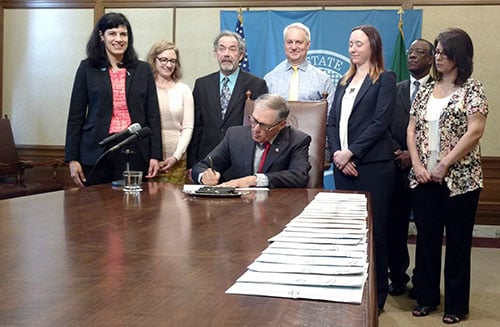The possibility that physical therapists (PTs) and physical therapist assistants (PTAs) could one day gain practice privileges in multiple states without having to obtain multiple state licenses is now a reality. This week, Washington signed on to the Physical Therapy Licensure Compact (PTLC), bringing the number of participating states to 10, the magic number of states needed to officially establish the system. Next up, actual implementation and an ongoing press for more states to join.
On April 25, Washington Gov Jan Inslee signed the bill that added Washington to Arizona, Kentucky, Mississippi, Missouri, Montana, North Dakota, Oregon, Tennessee, and Utah as states that have agreed to join a system that will allow PTs and PTAs to apply for privilege to practice in any of the participating states without having to be licensed in each state. It's a milestone for the physical therapy profession that opens the door for increased mobility.
The PTLC is based on the establishment of a commission—a governing body comprising representatives from every state that participates in the compact—that oversees rules, applications, and the issuing of privileges to practice in other participating states. Once the system is up and running, PTs and PTAs will be able to select the additional participating states in which they'd like to practice and apply for privileges, all while maintaining licensure in only their "home" state (for a more in-depth look at the system, check out this 2016 PT in Motion magazine article).
Compact arrangements exist in a few other professions, but it was the Federation of State Boards of Physical Therapy (FSBPT) that got the ball rolling for PTs and PTAs. APTA joined FSBPT in a collaborative effort to work out a system that would both protect the public and make sense for the profession. Once the architecture of the system was created, it was time to build the compact through work with individual state APTA chapters, state licensing boards, and the legislatures themselves.
The hurdle? A minimum of 10 states were necessary to establish the commission and get the ball rolling. Last year, Oregon, Arizona, Tennessee and Missouri adopted PTLC legislation. This year, the addition of 6 more states brought that number to 10. And away we go.
The waiting is the hardest part
But hold on: Washington's adoption on PTLC doesn't mean PTs and PTAs can now start practicing in compact states, says Angela Shuman, APTA's director of state affairs.
"Right now, it's important to understand that nothing has changed in terms of practicing across state lines for anybody, even after Washington," Shuman said. "To participate in the compact, PTs and PTAs will need to apply for privileges with the Physical Therapy Compact Commission, but that commission hasn't been established yet."
Shuman explained that after the commission is established, with each participating state naming a member, it must create rules for how the system will operate, including establishing fees. At the same time, logistical and technological issues will need to be resolved. These elements probably won't be in place until the first half of 2018, according to Shuman.
"Until then, it's business as usual," Shuman said. "If you want to work in another state, you have to apply for a license."
You can't always get what you want
Even after the commission is up and running, PTs and PTAs should be aware that the compact may not be for everyone.
"There will be strict criteria for participation in the compact," Shuman said. Among the requirements:
- The applicant can have no limitation from any state on a license to practice.
- No adverse licensing board action can have been taken against the applicant for at least 2 years prior to the application.
- The applicant must meet any jurisprudence requirements (typically an additional examination) that may be required by a compact state for which privileges are requested.
- The participant must report any adverse regulatory board action from a nonparticipating state within 30 days of the action being taken.
Don't stop thinkin' about tomorrow
While the addition of Washington into the PTLC was a landmark event, it’s just the beginning. The ultimate goal of the PTLC is to gain participation from every state, making it possible for PTs and PTAs to gain practice privileges anywhere in US, all while holding only 1 license. According to Shuman, compact legislation is still pending in a few states this year, with the possibility of more states taking on the legislation in 2018.
"Now that the compact can become operational, we're hoping this inspires even more APTA state chapters to advocate for compact legislation," Shuman said. "Staff at APTA national can help with this effort, and we now have a track record from 10 states to help guide us in the advocacy process." Shuman urges anyone interested in pursuing compact legislation to contact the APTA state affairs staff.
Want to keep up with what's happening at the state level? Check out APTA's State Legislative Tracker, an interactive map that allows you to select a topic and track legislative status. To learn more about the issues and find out how you can help, visit the association's state advocacy webpage.
|
